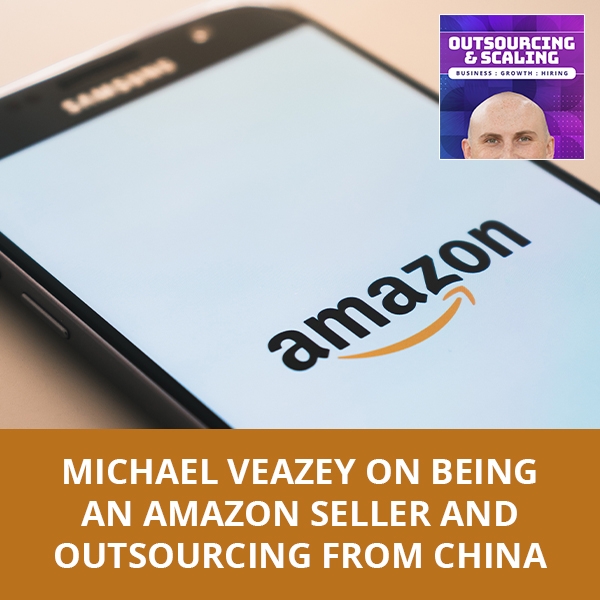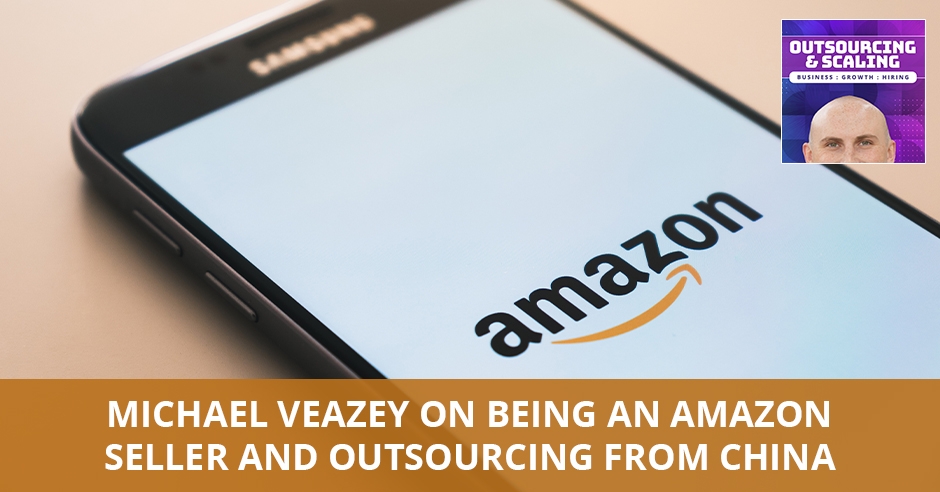


—
Listen to the podcast here:
[smart_track_player url=”https://www.podetize.com/statsapi/www.podetize.com/wp-content/uploads/fileuploads/11-5b145ef137b51b3d1af0633e9305c43d/08/2019/5c9d3d40e4182a7336012b9e33619f29%20%281%29.mp3″ title=”Michael Veazey on Being An Amazon Seller And Outsourcing From China” artist=”Nathan Hirsch” image=”https://freeup.net/wp-content/uploads/2019/04/OAS.png” ]
Download the audio file here.
Michael Veazey on Being An Amazon Seller And Outsourcing From China
I have a special guest, Michael Veazey. Michael, how are you doing?
I’m good. Thanks, Nathan. It’s great to be here. I love to see you again.
It’s always great to talk to you. For those of you who don’t know, Michael is an Amazon seller, Amazon podcaster and he runs the 10K Collective Mastermind, which we’re going to talk all about. First, I want to take a gigantic step back. Talk to me about what you were like growing up. Were you a rebel? Were you a straight-A student? Did you pass high school? Did you graduate from college? Walk us through that.
I have to say unlike the traditional entrepreneurial thing where you fail at school, you turned out to be quite good at sports and fantastic at selling lemonade to your friends at the age of five, none of that. I was a straight-A student. I wasn’t great at sports, although I like it. I’ve just been for a run. I’m not very fit, but I like it. I was an academic person and words were important to me. That’s why I’ve ended up doing the podcast as well. I love interacting with people. That’s why I ended up setting up the mastermind because I find that there is no substitute for talking to other sellers and other people in the business. It’s stimulating and exciting. As you would call it in English, I was swats at school. I’m not a rebel. It was more of a rebel when it came to work because I’m not very good at doing jobs that I’m not interested in. I have to be passionate about what I do. That didn’t work out so well. That’s no surprise, I’ve ended up running my own business from that point of view where you get to decide what you focus on.
How did you get into Amazon originally?
I was part of a group of people who were focused on selling their services as coaches ironically. I’ve still used that, but they flip the whole thing on its head when they discovered the Amazon opportunity and sold about 300 of us into training with one of the big trainers at the time, ASN 3 back in 2014. Back in the ancient era of Amazon, it seems now.
What was your first product launch? How did that go?
Some good and some bad. It took, first of all, a lot longer than I was hoping and expecting partly because I moved house, which doesn’t help. I started training in May 2014. I was hoping to get my first product live within three or four months. It didn’t go live. It was the 30th of November, the first sale was made and that was to me checking if the system was working. My first public sales was 1st of December. That’s the first thing. I tried to create a unique version of the product by having a slightly different plastic color finish, which didn’t seem like a radical change. After I’d ordered electronics from China, my first product, I was reading around. I read somewhere that about 10% of defects are normal from China if you don’t inspect in the area of electronics. I’m like, “That sounds awful.”
True enough, my first order of this unique looking product, which wasn’t very unique, but it was different enough back then. Out of 500 units, I had about 10% of them were defective. I had to basically can the rest of that. Fortunately, I have ordered another 500 basically, because the supplier had misunderstood me about their original design. That turned out to sell okay. I didn’t have the same flaws. I got off the mark, but it was a rocky start. That’s partly because my training didn’t tell me anything about how to source from China. If you’re getting any training from anyone, the first thing is to make sure you know how that works.
We’ve had other Amazon sellers on the podcast, mostly in the US. You’re in Europe. What should people know about running an Amazon business in the UK that they might be harder or it might be different than someone located in the US?
Sometimes people are disappointed when they hire somebody, but if you dig a bit deeper, it’s because they manage them badly.
First of all, you shouldn’t assume that you should sell in the UK. A lot of people do and do it successfully. A lot of people also sell in the US. If you’re getting stuff made in China, which is if you’re selling hard goods so it doesn’t go on or in your body. Topicals or consumables, it’s mostly going to be made in China. There’s a whole huge area around the China-US trade wars. If you want to get into that, I have my opinions. Broadly speaking, it’s going to be made in the Far East probably. From that point of view, if you’re importing into the UK or into the USA, it takes about the same time. It’s about the same amount of hassle. Even with the import taxes, it’s probably not going to be as expensive as VAT, which is you have to pay on imports if you’re importing to the UK.
A lot of the time it makes sense to import to the USA. It’s not vastly different, but you have to go through a couple of hoops that US-based people wouldn’t. You have to deal with a warehouse out there, which is one of the differences. If you’re a US-based and you’re selling in the US, you can get that stuff delivered to your house the first time and inspect it. It forces you to outsource that, which I don’t think is a bad thing because it forces you to not physically do stuff that is low-value tasks anyway. That’s the first thing I would say. Don’t assume you have to sell in the UK. You can sell in the US, but you’re going to have to use people on the ground. Apart from that, I don’t think it’s different. This is an incredibly international business. You can literally be anywhere on the planet with a laptop and a Wi-Fi connection.
Let’s talk about outsourcing because you mentioned it. Who was your first hire and how did that go?
I wouldn’t say first hire as much as my first outsourcing. I would say as my supplier and people forget that the entire business model unless I did have a mentoring client. He was making some skin cream in his own kitchen, which is amazing. That’s quite cool. For the vast majority of us, it is going to be somebody else making it. We all outsource unless you make stuff in your own kitchen. That’s the first person I heard it was the supplier eventually. He was the Designer to design the logo, which was cool. Somebody based in Britain said we could work in real-time, which is useful. A photographer as well, he was an old friend of mine. That works out well as well. This is on the first product and this is the minimum outsourcing. I also hired a receiving warehouse, FBA inspection near Los Angeles to inspect my products when they’re off in the US, only to discover all these defects. That was one of the things that I learned from that is inspecting China, which is something else you should outsource.
Have you had a horror story, a bad hiring experience that you could share that maybe you learned something from?
To be honest, no. I’ve had people that I’ve hired who haven’t done very much, but that’s because I didn’t do much to manage them. I hired somebody to source stuff in China for me and they did okay. They didn’t do an amazing job. They were based in the Philippines, which is not a bad place in terms of the time zone. It’s the same as China, but she wasn’t a native Chinese speaker. She didn’t have the connections to the factories. On the other hand, I gave her a fairly vague brief and left her to it. That was poor management. I haven’t got any horror stories of anyone I’ve hired. It’s funny you should say that. Sometimes people are disappointed when they hire somebody. Most of the time if you dig a bit deeper, it’s because they manage them badly. They may or may not be a good or bad contractor, but it’s hard to tell if you don’t manage them well.
You keep mentioning China so what are your thoughts on China? The big thing in the Amazon community is people are scared of all these Chinese sellers coming up and knocking off products. What’s your take on it and where do you see it going in the future?
Predicting the future is a difficult mug’s game. I would say there’s an interesting couple of books I’d been reading about this. I haven’t started reading or I’m about to read by Nassim Taleb called Antifragile. There’s another book I have read by Jim Collins called Great by Choice, which is all about companies including Microsoft, that did well in unstable environments. Rather than trying to predict the future, what I would suggest is that I have my ideas about where it’s going, but that’s pure speculation and who knows what Trump’s going to come out with next. I don’t think his own staff knows what he’s going to his tweet next. It’s all backwards and they compare to usual presidential behavior as far as I can tell from the outside, from the UK.
What I would say is if your business has got such thin margins that a small increase, I’m going to get 10% to 25% increases with big entity. You want to make sure you have nice fat margins in the first place so that if you are struggling but can still survive with trade wars, if it goes ahead in 25% tariff on $500 billion worth of goods or whatever it is, that you can survive. Because that means worst-case scenario, you survive and the best-case scenario is you thrive because you have most fat margins if that doesn’t go ahead. That would be my main thing. The other obvious things to say is sourcing for different places is the obvious play. Some of US businesses have started to source from Vietnam.
I know a couple of people who are starting to source from there. Vietnam is smart because it’s quite a good infrastructure. They have Asian work ethic but the Chinese, apart from the trade tariffs and stuff, what people don’t see, because it’s like all inflation more hidden is that the average Chinese wage has gone shooting up over the last few years. It’s not necessarily the best place to source either. The quality control and the infrastructure is great. You may choose to do that. One thing to do is look at other places. The other thing is to source domestically. The US is one of the points of what Trump’s doing. He has some point there. Even the way he’s doing it is crazy in my reckoning, but unusual shall we say. There are a lot of good US manufacturers still and you have some incredible manufacturing and quality control and all that.

One of the obvious things is to choose products you can source from the US. The great thing about that is a supply chain super short. Instead of a three-monthly time, it might be three weeks and the minimum order quantity can be very much lower with Western suppliers. Instead of ordering 1,000 plastic widgets from China as you would at $3 each, you might be able to order something. Maybe the cost is $10 each, but you only have to order 20 or 30 at a time, which makes less risk. There’s a lot of attractiveness in trying to source products domestically as well.
As someone that does a lot of masterminds, you Skype me in some time to talk about hiring. You’re running more and more. Can you talk about the importance of joining a mastermind and being a part of it? A lot of Amazon sellers, at least for the past five, ten years, they feel secluded. They feel like they have a product and everyone else is competition. They want to keep everything a secret. They’re off on their own. Why are masterminds important to help you grow your Amazon business?
You just put your finger on it. They’re off on their own. This is a business where you end up stuck behind a computer, which is passive and not physically active. We all know that sitting for a long time is bad for you. It doubles the risk of stroke and all that stuff. Physically getting out of the house is critical. It sounds primitive but it’s simple. It’s very important. Meeting other people, if you are solopreneur or you’ve got a small team, even if you’ve got a team, you can end up believing your own hype or just getting a narrow view of the world quickly if you’re not careful on them. That’s not healthy for your business. Connecting to other people is important.
Connecting in person is much more powerful. We’re talking live now, which is a great way of doing it. I’ve got a business coach who is based in Seattle, Washington, so you don’t have to connect physically, but if you can, there’s extra energy in the room. There’s something about that we’ve evolved to social creatures. There was something about you’re tapping into a basic thing of human behavior. It’s a good idea. What you just referred to about being defensive, you’ve got to choose the right people. You’ve got to have a good structure around you so you can trust the people you’re with. What I call a mastermind is what a lot of people call a mastermind is a massive gathering of 60 people with somebody talking from the front. That’s what call a master class type format. That has a lot of use and validity. I don’t think that’s a real mastermind.
What we do is deep dive into each business each time because we’ve only got ten people in the room. You can trust ten other people. If you select them carefully and you get to know each other, you can build on a very high level of trust. That’s when you can afford to reveal exactly what you sell. The other thing is that you can make sure that you don’t have direct competitors in the room. I turned away somebody from the mastermind. He was doing by £150,000 a month or whatever. That is $1.8 million a year in the US because he was going to be in conflict with another member. That was a great sadness to turn away a fantastic entrepreneur, but he was going to be in conflict with somebody else in the room. That’s the other critical thing is to make sure that whoever’s running it has got careful selection criteria so that you have non-compete agreements. More than anything that you learned to trust and know the people. You’ll know who you’re dealing with.
Sometimes Amazon sellers get into a routine of doing the same thing every single day, every single week. How do you plan out your year and what do you do differently each quarter, the first, the second, the third to the fourth? Can you talk a little bit about that?
My personal planning approach is bad. It is something I’m trying to work on becoming better at. A lot of the members of the masterminds are running much better. I probably refer to what they do is do what they do rather than what I do. I would say the first thing is planning costs is one thing. The serious people I know have a ten-year plan. The people who are pretty serious are doing $1 million, $2 million, $3 million a year and planning to sell a business in three or four years generally have a three-year plan and a one-year plan of where they want to be. It’s going to adjust because the world changes and life changes. You plan and it needs to fit into year-by-year planning ideally.
If you’re going to be launching a new product in Christmas, that’s the time when you need to be getting serious about that and getting the orders potentially in place depending on if you’re ordering from China and if you’re on air or sea freighting or whatever. If you’re planning to get started for the first time, now is the latest you can get started. I would suggest you work hard to get something out ready ranked and reviewed, ready to for Christmas sales. Those would be the two obvious things to do. That’s not radical or different, I’m afraid. What I think is different is big-picture planning. If you’ve got an established business, try and plan two, three years out rather than quarterly.
You obviously talked to a lot of Amazon sellers. What do you see working in 2019?
In a way, you need to do the opposite of what the majority of people are doing, which is I’m looking at some tool and it doesn’t matter which one you use. They’re all quite comparable and some of them work better than others in some way. Being led by numbers only, I don’t think it’s going to work well because the Chinese factories are beautifully placed now with a close relationship to Amazon, including either directly selling by Amazon on Amazon Basics or selling via the platform to exploit things that are obvious high-volume, low-margin markets. We continue to be even more imaginative, even better at understanding the customer, even better at creating a unique, well-designed product that does the job that you promise it does so that you get great reviews.
Connecting to other people is important, but connecting in person is so much more powerful.
The other thing as well is off Amazon marketing but selling on Amazon. People tend to think in terms of a binary choice between on Amazon and it’s all about Amazon PPC, which is important to get right or it’s a Shopify store. The On Amazon sales channel is incredibly powerful because the conversion rates are high. Amazon has everyone’s details on file, like credit card details. They have very high trust. That’s incredible to leverage. What you need to be doing and a lot of people in the masterminds are doing now more and more is influencer marketing, Instagram marketing, Pinterest and also even good old blog posts if you did it in the right way to drive external traffic onto your Amazon sales pages. That’s the big trend that I see coming from the inside track of the smart sellers. There’s nothing that’s going to go mainstream in 2019, 2020.
Michael, this has been great. Can you tell people more about you, where they can find out more about your masterminds and the other stuff you have going on?
If you want to generally get more information, AmazingFBA.com is the home base. We also have a Facebook group if you want to join it. If you’re just starting out, it’s AmazingFBA.com/fb. I’m about to start a new podcast. If you’re a more advanced seller or you want more advanced strategies, we bring in people. I’ve arranged an interview with one of the 10K Collective Mastermind members. A series of four interviews to go deep diving in how he’s gone from nothing a few years ago to on track for £1 million turnover now. It’s about $1.2 million. That’s on AmazingFBA.com/10k. It’s not live yet. You can sign up for an email list where you get early access to rough cuts of the interviews.
Thanks so much for coming on.
It’s my pleasure. It’s been fantastic to talk to you. Thanks for having me.
Important Links:
- Michael Veazey
- 10K Collective Mastermind
- Antifragile
- Great by Choice
- AmazingFBA.com
- AmazingFBA.com/fb
- AmazingFBA.com/10k
About Michael Veazey
 Michael Veazey has run the the Amazing Podcast for 3 1/2 years and over 300 episodes. He’s been an Amazon seller since December 2014 and delivered one-to-one tailored consultancy since April 2016. Since Sept 2017, Michael has run the 10K Collective Masterminds, tightly focussed groups of highly motivated entrepreneurs in e-commerce (focussed on Amazon) with substantial turnover and rapid revenue growth. His new podcast for advanced Amazon sellers “10K Collective” Launches 30 May.
Michael Veazey has run the the Amazing Podcast for 3 1/2 years and over 300 episodes. He’s been an Amazon seller since December 2014 and delivered one-to-one tailored consultancy since April 2016. Since Sept 2017, Michael has run the 10K Collective Masterminds, tightly focussed groups of highly motivated entrepreneurs in e-commerce (focussed on Amazon) with substantial turnover and rapid revenue growth. His new podcast for advanced Amazon sellers “10K Collective” Launches 30 May.
